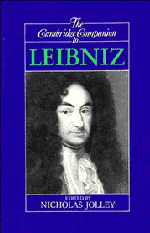Book contents
- Frontmatter
- 1 Introduction
- 2 G. W. Leibniz, life and works
- 3 The seventeenth-century intellectual background
- 4 Metaphysics: The early period to the Discourse on Metaphysics
- 5 Metaphysics: The late period
- 6 The theory of knowledge
- 7 Philosophy and logic
- 8 Philosophy and language in Leibniz
- 9 Leibniz
- 10 Leibniz's ontological and cosmological arguments
- 11 Perfection and happiness in the best possible world
- 12 Leibniz's moral philosophy
- 13 The reception of Leibniz in the eighteenth century
- Bibliography
- Index
5 - Metaphysics: The late period
Published online by Cambridge University Press: 28 May 2006
- Frontmatter
- 1 Introduction
- 2 G. W. Leibniz, life and works
- 3 The seventeenth-century intellectual background
- 4 Metaphysics: The early period to the Discourse on Metaphysics
- 5 Metaphysics: The late period
- 6 The theory of knowledge
- 7 Philosophy and logic
- 8 Philosophy and language in Leibniz
- 9 Leibniz
- 10 Leibniz's ontological and cosmological arguments
- 11 Perfection and happiness in the best possible world
- 12 Leibniz's moral philosophy
- 13 The reception of Leibniz in the eighteenth century
- Bibliography
- Index
Summary
Leibniz's late metaphysics is dominated by his theory of monads, a doctrine that posits that the only fully real beings are unextended, soul-like substances.' Since the seventeenth century, this theory has perplexed Leibniz's readers. Not only is the notion of the monad itself - a substance that is in his description “windowless” and “like a world of its own” - hard to fathom, but it is difficult to see how Leibniz means to integrate the doctrine of monads with a plausible account of the nature of matter and with his famous hypothesis of the preestablished harmony of soul and body.
I begin by looking briefly at the relationship of Leibnizls late metaphysics to his earlier thought from the vantage point of his New System (I), a transitional work that will also serve to introduce us to the issues most central to his later period. Subsequent sections examine the details of the theory of monads (11), his reduction of matter to monads (111), and the status accorded by his late philosophy to the notions of soul-body union and corporeal substance (IV).
- Type
- Chapter
- Information
- The Cambridge Companion to Leibniz , pp. 124 - 175Publisher: Cambridge University PressPrint publication year: 1994
- 4
- Cited by

